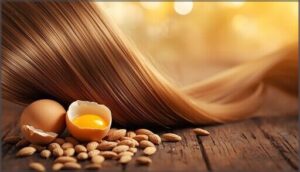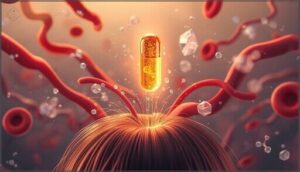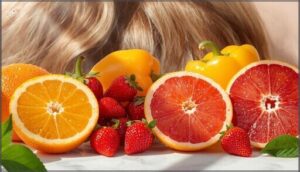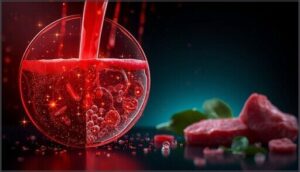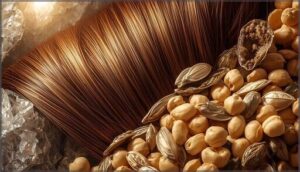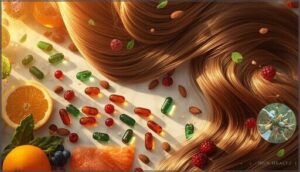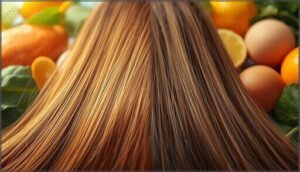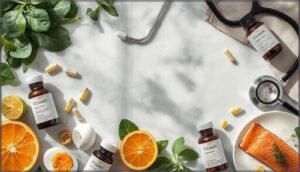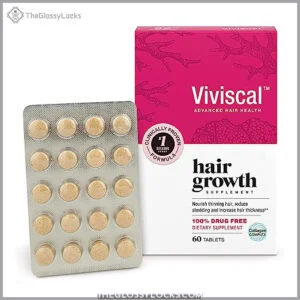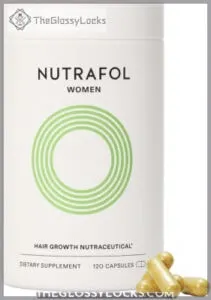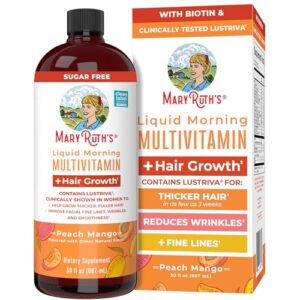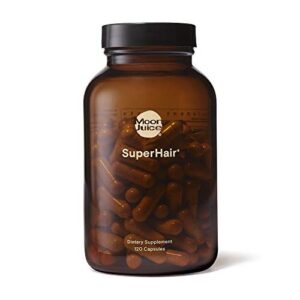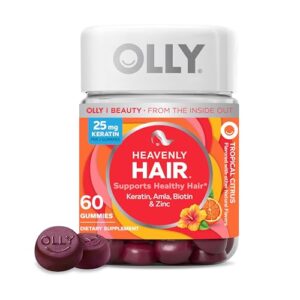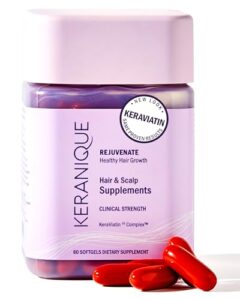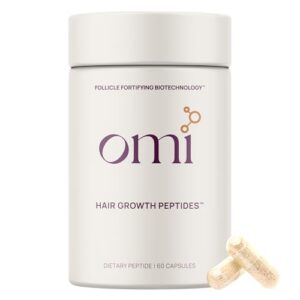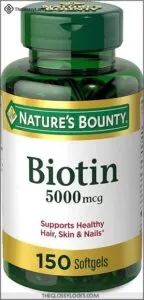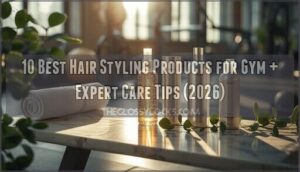This site is supported by our readers. We may earn a commission, at no cost to you, if you purchase through links.
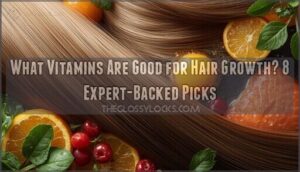
You stand in front of the mirror, running your fingers through noticeably thinner strands, and wonder when your hair started staging this slow retreat. The culprit might not be genetics, stress, or that expensive shampoo you swapped last month—it could be hiding in plain sight on your dinner plate.
Research shows that nutrient deficiencies trigger hair loss in up to 10% of adults, yet most people won’t connect brittle nails, persistent fatigue, and shedding hair until the damage becomes impossible to ignore. Your follicles demand a steady supply of specific vitamins to maintain their growth cycles, produce keratin, and anchor each strand firmly in place.
Understanding which nutrients fuel healthy hair growth gives you control over your scalp health, offering a science-backed path to reverse thinning before it progresses.
Table Of Contents
- Key Takeaways
- Key Vitamins for Hair Growth
- How These Vitamins Support Hair Health
- Signs of Vitamin Deficiency Affecting Hair
- Choosing Safe and Effective Hair Growth Vitamins
- Top Hair Growth Vitamin Supplements
- 1. Viviscal Hair Growth Supplement
- 2. Nutrafol Hair Growth Supplement
- 3. Maryruth Liquid Multivitamin Hair Growth Supplement
- 4. Moon Juice Hair Growth Vitamins
- 5. Olly Hair Growth Gummy Supplement
- 6. Keranique Hair Growth Supplements
- 7. Omi Hair Growth Peptides Supplement
- 8. Nature’s Bounty Biotin Supplement
- Tips for Maximizing Vitamin Benefits for Hair
- Frequently Asked Questions (FAQs)
- Which vitamin helps the most in hair growth?
- Do supplements and vitamins work to thicken hair?
- Is it possible to speed up hair growth?
- Which vitamin deficiency causes hair loss?
- Does biotin work for hair growth?
- How do you use rosemary oil for hair growth?
- What is the very best vitamin for hair growth?
- Which vitamin is good for hair growth fast?
- Do vitamins really help hair growth?
- What vitamin am I lacking if my hair is falling out?
- Conclusion
Key Takeaways
- Your hair follicles demand specific nutrients—biotin, vitamins D and C, iron, and zinc—to sustain growth cycles and keratin production, with deficiencies in these areas triggering up to 10% of adult hair loss cases.
- You’ll need consistent supplementation over 3–6 months to see visible improvements in hair thickness and reduced shedding, as no vitamin delivers overnight results regardless of marketing claims.
- High-dose supplements carry real risks, including lab test interference (biotin), bleeding complications (vitamin E), and nutrient competition (iron vs. zinc), making professional guidance essential before starting any regimen.
- Supplements work best when paired with lifestyle fundamentals—30 minutes of daily exercise, 7–9 hours of sleep, adequate hydration, and nutrient-dense meals—since vitamins can’t compensate for poor overall health habits.
Key Vitamins for Hair Growth
Your hair follicles need specific nutrients to function at their best, and when those run low, you’ll see the effects in your strands. Certain vitamins play direct roles in hair production, scalp health, and preventing breakage or shedding.
The right diet can make a real difference—adding foods to eat for hair growth ensures your follicles get consistent nourishment from within.
Here are eight research-backed vitamins that can make a real difference in your hair growth journey.
Biotin (Vitamin B7)
Biotin, also known as vitamin B7, powers keratin production to strengthen your hair from root to tip. You’ll need about 30 micrograms daily, though hair supplements often contain higher doses.
While biotin deficiency is rare, it can trigger thinning and brittle strands. Load up on eggs, almonds, and whole grains for natural sources.
Many experts emphasize that additional vitamins for hair growth play a critical role in supporting healthy and resilient hair.
Vitamin B Complex (Including B12)
Beyond B7 alone, you’ll benefit from the full B complex team—especially B12, which fuels red blood cell formation to deliver oxygen straight to your scalp. Niacin expands blood vessels for better nutrient delivery, while folate powers cell regeneration in your follicles.
This vitamin synergy creates conditions where biotin interactions boost, helping nutrients like vitamin C and vitamin D work harder for your hair.
Essential elements such as zinc, iron, and copper are among the shown to support stronger growth and prevent hair loss.
Vitamin C
Vitamin C delivers antioxidant effects that shield your follicles from oxidative stress while triggering a collagen boost to fortify each strand. This immune support powerhouse enhances iron absorption—cutting hair loss risk at the root—and promotes scalp health through improved circulation.
Citrus fruits, berries, and bell peppers supply the nutrition for hair strengthening and repair after heat styling or chemical treatments.
Vitamin D
Your follicle health hinges on Vitamin D’s ability to regulate growth cycles and extend the anagen phase. Low levels trigger thinning and shedding, especially in regions with limited sun exposure.
To combat Vitamin D deficiency risks and support scalp health:
- Get 15-20 minutes of midday sun exposure
- Eat fortified dairy and fatty fish
- Test your levels if hair loss persists
- Consider supplementation after consultation
- Monitor biotin and other vitamins for synergy
Vitamin E
You need antioxidant effects to shield your scalp from oxidative damage that weakens follicles and slows hair growth. Vitamin E aids scalp health by maintaining sebum production and improving microcirculation for better nutrient absorption.
You’ll find it in nuts, seeds, and leafy greens. Just watch high-dose supplements—they can interact with blood thinners, so talk to your doctor first.
Iron
Your hair follicles demand oxygen to thrive, and iron deficiency can choke off their supply. Low iron triggers anemia, reducing red blood cells that deliver oxygen to your scalp, leading to thinning and shedding.
Iron aids hair growth through:
- Oxygen delivery to follicles for healthy cycling
- Red blood cell formation preventing anemia
- Aiding hair follicle health and strength
- Reducing hair loss from nutritional deficits
- Maintaining energy for cellular hair processes
Zinc
Zinc deficiency won’t just weaken your strands—it’ll sabotage your growth cycle altogether. This trace mineral fortifies your follicles by supporting protein synthesis and cell division, essential for hair fortification.
Zinc benefits extend to balancing scalp oil production and preventing shedding. Without adequate zinc supplements or nutrient balance through diet, you risk thinning similar to biotin or vitamin C deficits.
Most adults need 8–11 mg daily to prevent mineral deficiency and hair loss.
Omega-3 Fatty Acids
Fish oil supplements and omega 3 sources don’t just support brain health—they nourish follicles from within. These essential fatty acid benefits reduce inflammation that strangles growth, delivering nutrition for hair growth through foods like salmon, flaxseed, and walnuts.
- Promotes scalp circulation for healthier follicles
- Reduces oxidative stress damaging hair shafts
- Enhances shine and strand elasticity
- Combats dryness and flaking at the roots
- Strengthens membranes around each follicle
Without adequate omega-3s, you’re fighting an uphill battle against thinning.
How These Vitamins Support Hair Health
Your hair doesn’t grow in a vacuum—it needs the right nutrients to thrive, and each vitamin plays a specific role in keeping your follicles healthy and productive.
Understanding how these vitamins work can help you make smarter choices about what you’re putting in your body. Here’s what these powerhouse nutrients actually do for your hair.
Promoting Keratin Production
Your hair’s strength starts at the molecular level—biotin drives keratin production, the structural protein that forms each strand. Aim for 30 micrograms daily to fuel hair protein synthesis and fortify your locks from within.
Vitamin C, around 75-90 milligrams, facilitates keratin cross-linking through collagen formation. This nutrient optimization creates the foundation for resilient, breakage-resistant hair growth.
Enhancing Scalp Circulation
Think of your scalp as a nutrient highway—vitamins like vitamin E boost blood flow to hair follicles by improving vascular health, while vitamin C strengthens capillary walls for better circulation.
Pair these with scalp massage using circular motions for three to five minutes daily, and you’ll enhance circulation techniques that deliver biotin and other hair growth essentials directly where they’re needed most.
Preventing Hair Thinning and Loss
Your hair loss causes often trace back to nutrient gaps, and specific vitamins tackle thinning prevention head-on. Biotin strengthens each strand, while vitamin D regulates follicle cycling to reduce excessive shedding. Iron keeps hemoglobin levels steady—preventing the cascade that leads to hair thinning.
Combine targeted hair care tips like scalp massage with these growth strategies, and you’ll block the pathways that drive hair loss before it starts.
Supporting Healthy Follicles
Beyond slowing hair loss, you’ll need to feed the hair follicle itself. Follicle health depends on precise nutrition for hair growth—B vitamins fuel rapid cell division, while vitamin E shields against oxidative stress that damages follicle walls.
For ideal follicle stimulation and scalp care, prioritize:
- Biotin to strengthen keratin synthesis at the root
- Vitamin D to regulate follicle cycling patterns
- Omega-3s to reduce inflammation around each follicle
Signs of Vitamin Deficiency Affecting Hair
Your hair often sends the first warning signals when your body’s running low on essential nutrients. Missing out on key vitamins doesn’t just slow growth—it can trigger visible changes like thinning, breakage, or even shedding that catches you off guard.
Here’s what to watch for, how deficiencies mess with your follicles, and when it’s time to get your levels checked.
Common Symptoms of Deficiency
Your body sends clear signals when vitamin imbalances strike. Persistent fatigue that won’t quit, hair thinning across your scalp, and pale skin point to iron or biotin deficits. Tingling hands, brittle nails, and chronic digestive issues flag low vitamin D or zinc levels.
Nutrient deficits also trigger scalp issues like dryness and slow healing—warning signs you can’t afford to ignore.
How Deficiencies Lead to Hair Problems
When your body runs low on biotin, zinc, iron, or Vitamin D, follicle damage accumulates fast. Nutrient imbalance disrupts keratin production and stem cell cycling, triggering hair shedding across your scalp. Low iron slows follicle metabolism, while zinc deficiency impairs shaft formation and scalp health.
Deficiency symptoms cascade through your follicles:
- Iron depletion stalls DNA synthesis, weakening every strand
- Vitamin D shortfalls disrupt growth phases and increase shedding
- Zinc loss dries your scalp and cracks hair fibers
When to Test for Deficiencies
Schedule deficiency testing if you’re battling persistent fatigue, brittle nails, or unexplained hair loss. Nutrient screening for Vitamin D, biotin, zinc, and iron pinpoints gaps blocking regrowth.
Health risk assessment becomes essential after drastic diet shifts, limited sun exposure, or during pregnancy planning. Vitamin level checks confirm whether supplements are absorbing properly, turning guesswork into targeted hair loss diagnosis.
Choosing Safe and Effective Hair Growth Vitamins
You can’t just grab any hair supplement off the shelf and expect miracles—some can do more harm than good if you’re not careful. Understanding the right dosages, potential side effects, and when to bring in a professional will help you make smarter choices that actually work.
Here’s what you need to know before you commit to any hair growth vitamin.
Recommended Daily Allowances
You don’t need to megadose vitamins for hair growth—sticking to RDA Standards keeps you safe and effective. For biotin, aim for 30 micrograms daily; Vitamin D requires 600 IU; iron needs vary (8 mg for men, 18 mg for premenopausal women); and zinc sits at 8-11 mg.
Meeting these Daily Intake Limits through Dietary Guidelines ensures Nutrient Balance without risking Supplement Safety issues.
Possible Side Effects and Interactions
While biotin may trigger acneiform rash or skew thyroid lab results, vitamin D overdosage can lead to hypercalcemia with nausea and confusion. High-dose vitamin E increases bleeding risk if you’re taking anticoagulants. Iron and zinc compete for absorption, creating nutrient imbalances.
Always review interaction warnings and dosage guidelines with your clinician—especially if you’re on prescription medications—to sidestep toxicity risks and allergic reactions.
When to Consult a Healthcare Professional
If rapid hair loss hits or you’re juggling multiple medications, professional advice is non-negotiable. You need medical guidance before starting vitamins when:
- Hair shedding accelerates over two months despite solid hair care
- You’re on blood thinners that risk supplement interactions
- Systemic symptoms like fatigue or pale nails accompany thinning
- Biotin or zinc supplementation hasn’t improved growth after twelve weeks
- Autoimmune history or thyroid concerns complicate your hair loss diagnosis
Top Hair Growth Vitamin Supplements
You’ve learned what vitamins your hair needs and how to spot the signs of deficiency. Now it’s time to break free from guesswork and take control with supplements that actually deliver results.
Here are eight expert-backed options that combine the right ingredients, clinical evidence, and real-world effectiveness to help you reclaim thicker, healthier hair.
1. Viviscal Hair Growth Supplement
If you’re ready to take control of thinning hair, Viviscal delivers a clinically proven option backed by over 25 years of research. This supplement centers on AminoMar Marine Complex—a proprietary blend of marine proteins and amino acids that nourishes follicles from within.
Combined with biotin, vitamin C, zinc, and iron, it aids keratin production and strengthens existing strands. You’ll take two tablets daily with meals, and results usually emerge around the three-month mark.
Just note: those with seafood allergies should review ingredients carefully before starting.
| Best For | Women dealing with thinning hair from stress, postpartum changes, hormones, or aging who want a research-backed supplement that works from the inside out. |
|---|---|
| Form | Tablet |
| Price | $44.00 |
| Target User | Women |
| Biotin Content | Yes |
| Results Timeline | 3 months |
| Special Diet | No |
| Additional Features |
|
- Clinically proven formula with 25 years of research behind the AminoMar Marine Complex
- Covers multiple angles with biotin, vitamin C, zinc, and iron to support keratin production and stronger hair
- Works for all hair types, including color-treated and fine hair
- Takes around 3 months to see results, so you need patience and consistency
- Higher price point compared to basic hair vitamins
- Not suitable if you have seafood allergies due to marine-based ingredients
2. Nutrafol Hair Growth Supplement
If stress and hormones are sabotaging your hair, Nutrafol targets six root causes—including inflammation and oxidative damage—with 21 standardized ingredients. You’ll find saw palmetto to block DHT, ashwagandha to tame cortisol, marine collagen for keratin building, and tocotrienols to protect follicles.
Four capsules daily deliver drug-free support, and visible improvements usually surface between three and six months. At $88 per month, it’s an investment, but dermatologists consistently recommend it for women dealing with stress-related shedding and thinning.
| Best For | Women dealing with stress-related hair thinning who want a science-backed supplement that addresses multiple root causes instead of just one factor. |
|---|---|
| Form | Capsule |
| Price | $88.00 |
| Target User | Women 18-44 |
| Biotin Content | No |
| Results Timeline | 3-6 months |
| Special Diet | No |
| Additional Features |
|
- Targets six different causes of thinning (stress, hormones, inflammation) with clinically studied ingredients like ashwagandha and saw palmetto
- Dermatologist-recommended brand with a comprehensive blend of 21 vitamins and natural ingredients
- Works for all hair types and addresses shedding from lifestyle factors, not just genetics
- Expensive at $88 per month, which adds up to over $1,000 annually
- Results take 3-6 months to show, so you need patience and consistency
- Requires taking four capsules daily, which some people find inconvenient
3. Maryruth Liquid Multivitamin Hair Growth Supplement
If you’d rather skip capsules altogether, MaryRuth’s liquid formula delivers 10,000 mcg of biotin, vitamin D3, B-complex vitamins, and Lustriva—a proprietary blend shown to promote thicker hair in women within three weeks.
Two tablespoons of peach-mango-flavored liquid each morning provide your daily dose, and the vegan, gluten-free formulation absorbs quickly.
At $74.95 for a 30-ounce bottle, it’s a solid middle-ground option that aids energy metabolism and skin clarity alongside hair growth.
| Best For | Women looking for an easy-to-take liquid multivitamin that supports hair growth, skin health, and energy without dealing with pills. |
|---|---|
| Form | Liquid |
| Price | $74.95 |
| Target User | Women |
| Biotin Content | 10,000 mcg |
| Results Timeline | Varies |
| Special Diet | Vegan/Gluten-free |
| Additional Features |
|
- Clinically tested Lustriva shows hair thickness improvements in as little as three weeks
- High-dose biotin (10,000 mcg) plus vitamins C, D3, and B-complex support hair, skin, nails, and energy
- Vegan, gluten-free, and allergen-friendly with a pleasant peach mango flavor that absorbs quickly
- Pricey at $74.95 per bottle compared to standard multivitamins
- Requires consistent daily use—won’t deliver overnight results
- Won’t restore hair follicles in cases of significant balding or permanent hair loss
4. Moon Juice Hair Growth Vitamins
Moon Juice SuperHair packs 10 bioavailable vitamins—including A, B-complex, C, D, E, and K—with adaptogens like ashwagandha to tackle stress-driven shedding. You’ll also get saw palmetto and pumpkin seed to support hormonal balance, plus horsetail, biotin, and kelp for texture and strength.
The vegan capsules skip gluten and dairy, and you take four each morning. At $46.20 for a month, it’s positioned between budget picks and premium formulas, though quality control hiccups have surfaced in customer feedback.
| Best For | People dealing with stress-related hair thinning who want a comprehensive vitamin formula that addresses both nutritional gaps and hormonal balance. |
|---|---|
| Form | Capsule |
| Price | $46.20 |
| Target User | All |
| Biotin Content | Yes |
| Results Timeline | 4 weeks-90 days |
| Special Diet | No |
| Additional Features |
|
- Clinical-strength formula with 10 bioavailable vitamins plus adaptogens to tackle stress-driven shedding
- Includes DHT-blocking ingredients like saw palmetto and pumpkin seed for hormonal support
- Vegan, gluten-free, and dairy-free capsules that are easy to take once daily
- Pricey at $46.20 per month compared to basic hair vitamins
- Some customers reported quality control issues like empty or inconsistent capsules
- Results vary widely—some see improvements within a month while others see no change at all
5. Olly Hair Growth Gummy Supplement
Olly Heavenly Hair delivers 250 mcg of biotin, 25 mg of keratin, and amla extract in a chewable tropical-citrus gummy—two per day for a month. Horsetail and silica round out the formula to reinforce strand structure from the inside.
At under $15 for 60 gummies, you get a gluten-free option with no synthetic colors, though some users flag occasional dizziness or melted bottles in transit. It’s a straightforward choice when you want hair support without swallowing pills.
| Best For | People who want an affordable, chewable alternative to hair-growth pills and don’t mind a tropical-citrus flavor. |
|---|---|
| Form | Gummy |
| Price | $15.99 |
| Target User | All |
| Biotin Content | Yes |
| Results Timeline | Varies |
| Special Diet | Gluten-free |
| Additional Features |
|
- Budget-friendly at under $15 for a month’s supply with biotin, keratin, and amla
- Gluten-free with no synthetic colors or flavors
- Easy-to-take gummy format instead of swallowing capsules
- Some users report dizziness or find the taste unappealing
- Inconsistent results—doesn’t work for everyone
- Quality control issues like melted or partially filled bottles
6. Keranique Hair Growth Supplements
Keranique Hair Growth Supplements pack 330 mcg of biotin, 12.2 mg of pantothenic acid, and 7.5 mg of zinc into two daily softgels designed to fuel keratin production and scalp health. The proprietary KeraViatin Complex adds 755 mg of vitamins, amino acids like L-cysteine, and bamboo shoot extract to nourish follicles from within.
You’ll need three months of consistent use to see thicker coverage, and the large pills can be tough to swallow. At $37.99 for a month’s supply, it’s a middle-tier pick for tackling thinning hair.
| Best For | Women dealing with thinning hair who want a biotin-rich supplement and don’t mind waiting three months to see results. |
|---|---|
| Form | Softgel |
| Price | $37.99 |
| Target User | Women |
| Biotin Content | Yes |
| Results Timeline | 3 months |
| Special Diet | No |
| Additional Features |
|
- High biotin dose (330 mcg) plus amino acids and vitamins that support keratin production and scalp health
- Proven to improve hair coverage and thickness with consistent use
- Softgel format absorbs easily compared to tablets
- Takes at least three months of daily use before you’ll notice visible changes
- Large pill size can be hard to swallow for some people
- May trigger breakouts or skin reactions in sensitive users
7. Omi Hair Growth Peptides Supplement
Omi Hair Growth Peptides delivers a patented IFP Hair Growth Peptide blend alongside biotin, B6, zinc, and copper in two daily capsules designed to anchor each strand at the follicle root.
You’re targeting the hair growth cycle itself, not just surface-level nutrition—this formula aims to strengthen retention and reduce shedding by reinforcing the root attachment.
Expect to wait 90 days for visible changes, and budget $79 for a month’s supply. It’s a bioactive approach for anyone ready to tackle thinning from the inside out.
| Best For | Women dealing with thinning hair or increased shedding who want a science-backed supplement that works at the follicle level and are willing to commit to at least three months of use. |
|---|---|
| Form | Book |
| Price | $24.99 |
| Target User | All |
| Biotin Content | N/A |
| Results Timeline | N/A |
| Special Diet | Vegetarian |
| Additional Features |
|
- Targets the root cause by strengthening follicle attachment rather than just surface nutrition
- Clinically shown to reduce hair loss and increase thickness with a patented peptide blend
- Simple two-capsule daily routine with comprehensive support from biotin, B6, zinc, and copper
- Requires a 90-day commitment before seeing visible results, which tests patience
- At $79 per month, it’s a premium investment that adds up over the recommended timeline
- May cause stomach upset in some users, and results vary—some see reduced shedding rather than dramatic new growth
8. Nature’s Bounty Biotin Supplement
Nature’s Bounty Biotin packs 5000 mcg of vitamin B7 into rapid-release softgels that support keratin production and metabolic pathways essential for healthy hair strands. You’ll find it gluten-free, non-GMO, and free from artificial flavors, making it a straightforward daily option.
Plan to take one to two softgels with meals and give it at least six months to see real improvements in strength and shine.
Just know high-dose biotin can skew certain lab tests, so alert your doctor before bloodwork.
| Best For | People looking for an affordable, high-dose biotin supplement to strengthen hair, skin, and nails over the long term without artificial additives. |
|---|---|
| Form | Capsule |
| Price | $79.00 |
| Target User | Women |
| Biotin Content | Yes |
| Results Timeline | 3 months |
| Special Diet | No |
| Additional Features |
|
- High 5000 mcg dose in easy-to-swallow softgels that absorb quickly
- Non-GMO and free from gluten, sugar, and artificial ingredients
- Supports energy metabolism and nervous system health alongside beauty benefits
- Results take at least six months to become noticeable
- High-dose biotin can interfere with certain medical lab tests
- Softgels may melt or get damaged if exposed to heat during shipping
Tips for Maximizing Vitamin Benefits for Hair
Getting the most out of your hair vitamins isn’t just about popping a pill. A few smart habits can make all the difference in your results.
Here’s what you should keep in mind to help your hair thrive.
Best Practices for Consistency and Dosage
Your hair growth journey demands commitment, not chaos. Take your vitamins at the same time daily—breakfast works best for consistent adherence tracking and stomach comfort. Set alarms, use a 30-day log, and stick to recommended biotin and supplement dosages without doubling up if you miss a dose.
Here’s your roadmap:
| Action | Timing | Benefit |
|---|---|---|
| Daily routine anchor | Same time window | Reduces missed doses |
| Adherence tracking | 30-day log | Reinforces consistency |
| Dosage control | No catch-up doses | Prevents nutrient overload |
Combining Diet and Supplements
Supplements don’t replace breakfast—they complement it. You’ll get the best return when vitamins and supplements work alongside nutrient-dense meals, not in isolation from them.
- Eat vitamin C–rich foods with iron to boost absorption during lunch or dinner.
- Take fat-soluble vitamins (A, D, E) with meals containing healthy fats like avocado or nuts.
- Space calcium and iron several hours apart to prevent competition.
- Include protein-rich foods to support zinc and biotin uptake.
- Build a 7-day meal plan covering key nutrients before adding hair growth supplements.
Lifestyle Habits That Boost Results
Think of vitamins as seeds and your lifestyle as the soil—without the right conditions, you won’t see growth. Daily exercise for 30 minutes, 7–9 hours of sleep, and drinking 2–3 liters of water boost supplement absorption while lowering stress hormones that trigger shedding.
Vitamins won’t work without the right lifestyle—exercise, sleep, and hydration create the conditions your hair needs to actually grow
| Habit | Hair Growth Impact |
|---|---|
| Balanced diet with protein | Supplies amino acids for keratin |
| Stress management routines | Reduces cortisol-linked hair loss |
| Healthy hydration practices | Promotes scalp and follicle health |
| Consistent sleep patterns | Facilitates follicle renewal cycles |
These habits turn good supplements into real results.
Tracking Hair Growth Progress
You can’t improve what you don’t measure. Use a ruler or measurement tools to track hair growth every 4–6 weeks, photographing the same scalp sections under consistent lighting. Note length, hair thickness, and scalp health in a simple log.
Growth rate analysis shows whether your vitamins and nutrition for hair growth are working—most people see progress monitoring pay off after 3 months of hair care.
Frequently Asked Questions (FAQs)
Which vitamin helps the most in hair growth?
No single champion carries the trophy—biotin fuels keratin production while vitamin D awakens dormant follicles.
Your scalp needs a team effort: iron delivers oxygen, zinc repairs tissue, and nutrients work together orchestrating growth.
Do supplements and vitamins work to thicken hair?
You can thicken hair with targeted vitamins and supplements, but results depend on nutrient balance and underlying deficiencies.
Biotin, iron, and vitamin D support hair regrowth when levels are low, improving hair thickness over consistent use.
Is it possible to speed up hair growth?
You can’t drastically accelerate hair growth rates beyond genetics, but optimizing nutrition for hair growth through vitamins, biotin, and hair supplements promotes healthier follicle activation, potentially maximizing your natural growth cycle and hair thickness.
Which vitamin deficiency causes hair loss?
Vitamin deficits in iron, zinc, biotin, and vitamin D commonly trigger hair shedding and follicle damage.
Nutrient imbalance disrupts scalp health, weakening keratin production and slowing growth cycles—deficiencies you can detect through blood tests.
Does biotin work for hair growth?
If you’re already getting enough through diet, biotin supplements won’t necessarily boost hair growth. However, restoring biotin levels in those with deficiency can improve hair thickness and reduce shedding substantially.
How do you use rosemary oil for hair growth?
Dilute rosemary oil with a carrier oil at a 1-to-3-drop ratio per teaspoon, then massage into your scalp for several minutes twice weekly.
Leave it in for at least 15 minutes before rinsing.
What is the very best vitamin for hair growth?
There’s no one-size-fits-all answer in hair nutrition research—biotin often gets much attention for keratin support, but your body’s growth factors depend on addressing specific deficiencies in iron, zinc, or vitamin D through proper supplement safety practices.
Which vitamin is good for hair growth fast?
Biotin, zinc, and iron often deliver the fastest results when you’re deficient—but no vitamin creates overnight hair growth.
Consistent supplement dosage over three to six months usually reveals visible improvements in thickness and strength.
Do vitamins really help hair growth?
Yes, vitamins help hair growth when addressing deficiencies.
Iron or vitamin D supplementation reverses hair loss linked to nutrient gaps, supporting follicle health and keratin production, though results require consistent use over several months.
What vitamin am I lacking if my hair is falling out?
Hair loss often signals nutrient deficiencies in iron, vitamin D, zinc, or B
Low ferritin levels particularly trigger shedding. If you’re experiencing thinning hair, testing for nutrient imbalances can pinpoint the root cause.
Conclusion
Your follicles function best when fed properly—that’s the foundation of reversing thinning before it becomes permanent.
Now that you know what vitamins are good for hair growth, you hold the blueprint to rebuild density from the inside out. Track your progress monthly, pair supplements with nutrient-rich meals, and consult your dermatologist if shedding persists beyond three months.
Your scalp’s recovery starts with consistent action, not wishful thinking.
- https://www.instagram.com/highbrowhippie/?hl=en
- http://brigittearley.com/
- https://nutrafol.pxf.io/c/1955282/1452127/17065?subid1=FA53XMQe8ef2inoTKFlRs5_5ilyiiarCU7d&subid2=%2Fhealth%2Fsupplements%2Fbest-vitamins-and-supplements-for-hair-growth%2F&subid3=Health
- https://www.fda.gov/drugs/pharmaceutical-quality-resources/facts-about-current-good-manufacturing-practice-cgmp
- https://pmc.ncbi.nlm.nih.gov/articles/PMC9324272/

